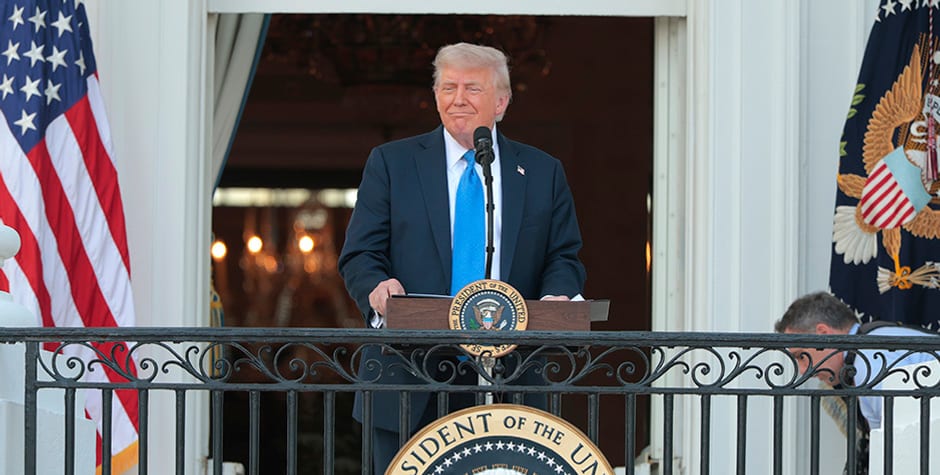Federal Court Rejects DNC Lawsuit, Affirms President Trump’s Authority, Siding With ACLJ Filing
Listen tothis article
We just helped secure a tremendous victory in the ongoing battle to preserve constitutional separation of powers. A federal court just agreed with the ACLJ’s arguments in our amicus brief, dismissing the Democrat Party’s politically motivated attempt to constrain President Trump’s constitutional authority over the Executive branch in Democratic National Committee v. Trump.
As we told you previously, this case was an attempt to, once again, utilize preliminary injunctions and temporary restraining orders (TROs) to obstruct President Trump’s constitutional authority nationwide. These rulings, often by a single district judge, can halt Executive actions nationwide – undermining the will of voters.
In DNC v. Trump, the DNC sought to block an Executive order directing federal agencies like the Federal Election Commission (FEC) to align enforcement with presidential policy. The DNC argued that the order should be suspended while the case winds through the courts – a process that can take years. This clashes with the Constitution, which states the President, elected by the people, is the sole figure accountable for the Executive branch. Agency leaders are unelected and act with authority only through the President. We believe this makes judicial interference especially problematic and politically charged. Fortunately, the court sided with our arguments.
This decisive ruling validates the ACLJ’s position, as articulated in our brief, that the Democrat Party’s lawsuit represented nothing more than another attempt to weaponize the judicial system against President Trump and undermine the Executive branch’s legitimate authority.
The court dismissed both counts of the DNC’s complaint. Most significantly, the court found that the Democrat Party had failed to demonstrate any concrete injury sufficient to establish standing under Article III of the Constitution. As we predicted, the plaintiffs could not point to any harm exacted by President Trump’s Executive Order 14215. This Executive order simply stated what should be obvious: The President is the head of the Executive branch and has the authority to make decisions for it.
The court’s opinion completely dismantled the DNC’s narrative. Despite dramatic claims about threats to FEC independence, the DNC could not provide evidence of actual harm. Their central claim – that they were chilled into changing their conduct based on speculative fears – was rejected under long-standing precedent, particularly the Supreme Court’s ruling in Clapper v. Amnesty International USA.
The court emphasized that vague fears or costly self-imposed precautions do not establish standing. As Judge Ali wrote, the Executive order “does not regulate, constrain, or compel any action on [the DNC’s] part.”
The court’s ruling upholds a foundational constitutional principle: The President has the authority to oversee the Executive branch, including independent agencies like the FEC. Executive Order 14215 simply reinforces coordination and accountability – without infringing on the FEC’s statutory independence. The FEC, though granted a degree of independence by Congress, is still part of the Executive branch. The heads of such agencies are not elected – they are appointed by the President, who remains ultimately accountable to the people. That’s how our system of government works.
Had the Democrat Party succeeded, it would have set a dangerous precedent – encouraging courts to micromanage Executive branch operations based on partisan lawsuits. The dismissal rightly prevents this kind of judicial overreach and reaffirms that such disputes belong in the political arena, not the courtroom. Judge Ali’s careful analysis also acknowledged that oversight of the Executive branch must be rooted in law, not politics. While the ruling leaves the door open to future challenges if circumstances change, it firmly rejects the idea that courts should entertain lawsuits based on speculative harm or political disagreements.
This case is part of a troubling trend of using courts to undermine the constitutional role of the presidency. The court’s rejection of this lawsuit sends a clear message: Federal courts will not serve as tools for political actors looking to bypass the democratic process. President Trump was elected to reform federal agencies and bring greater accountability to Washington. Executive Order 14215 reflects that mandate – and now, a federal court has confirmed its legitimacy.
The ACLJ’s amicus brief played a critical role in helping the court understand the broader constitutional stakes. We are proud to have contributed to this victory, which protects the rule of law and defends the constitutional separation of powers. We remain committed to pushing back against efforts to use the legal system for political ends. Whether in the courts, in Congress, or in public discourse, the ACLJ will continue defending constitutional governance and preserving liberty for future generations.
